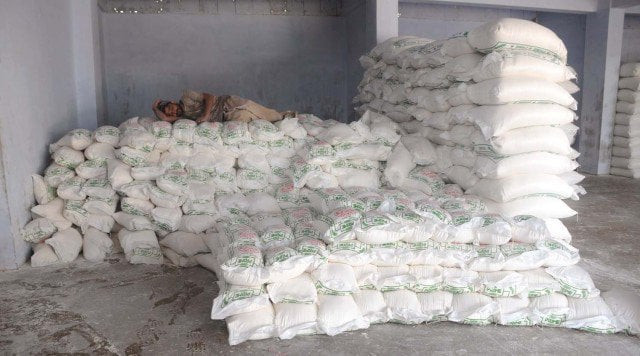Millers scale down flour supply to shops
Drop in wheat quota from Food Department creates shortage in the market

PHOTO : MOHAMMAD NOMAN
Citizens and those who distribute ration among the needy in Ramazan are having difficulty in obtaining flour according to demand.
Reportedly, if wheat is not delivered to the mills, the risk of a flour crisis in Punjab will increase in the next few days.
Given the seriousness of the situation, deputy directors of the Food Department, district food controllers and mill owners have informed the top officials.
Also, food officers in the province are confused because of disagreements over the procedure for issuing permits between the department’s officials.
On the other hand, the deputy commissioners of south Punjab have issued directives to the district food controllers to issue permit on a few among the received applications.
Sources revealed that for the past week, flour mills, especially in Lahore, Rawalpindi, Gujranwala and Faisalabad, were not allowed to buy wheat from south Punjab and permits of very small quantities were being accepted.
On the other hand, the department has reduced the daily quota of flour mills in Lahore from 55 sacks to 40 sacks per roller.
The quota of Rawalpindi’s mills has been reduced to 10 sacks, while the quota of other districts has also been reduced.
In this situation, the flour mills of many cities, including Lahore and Rawalpindi, have difficulty meeting the requirements of local people due to the non-availability of wheat as per demand.
The quantity of flour supplied regularly in the market has decreased by 40 to 50 percent, which is expected to increase in the next three to four days.
According to the dealers and shopkeepers, people had bought extra flour due to the lockdown enforced to curb coronavirus, which did not indicate the impact of the shortage of supply in the market.
But in the future, when the people who distribute ration in Ramazan and those who buy flour for daily use will come to the markets, the flour mills will not be able to meet the demand and there will be a shortage.
Reportedly, once the major cities have a shortage, then it takes two to three weeks to overcome it because citizens start additional shopping in panic.
In Lahore, the normal daily requirement of flour is 180,000 bags of 20 kilogrammes, while in Rawalpindi it is 125,000 bags. But due to the large distribution of rations by the philanthropists amid the lockdown, and with few days left in Ramazan, there will be a large number of flour purchases by the citizens and donors.
Punjab Food Secretary Waqas Ali Mehmood told The Express Tribune that flour mills have been receiving information about having reduced supply due to shortage of wheat.
“The gap in demand and supply in the market is indeed increasing,” he said. “We are trying to control the situation,” he added.
When contacted by The Express Tribune, Flour Mills Association Chairperson Asim Raza said over that the past week, the supply of flour has started to be severely affected due to barriers in wheat procurement and delivery to the mills.
“This time too, the crisis is due to mismanagement,” he added.
Published in The Express Tribune, April 20th, 2020.


















COMMENTS
Comments are moderated and generally will be posted if they are on-topic and not abusive.
For more information, please see our Comments FAQ